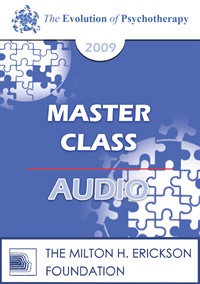
- Average Rating:
- Not yet rated
- Topic Areas:
- Brief Therapy | Experiential Therapy | Gestalt | Hypnosis | Ericksonian Hypnosis and Therapy Techniques | Hypnotherapy | Master Classes | Psychotherapy
- Categories:
- Evolution of Psychotherapy | Evolution of Psychotherapy 2009
- Faculty:
- Jeffrey Zeig, PhD | Erving Polster, PhD
- Duration:
- 2 Hours 42 Minutes
- Format:
- Audio Only
- Original Program Date:
- Dec 14, 2009
- Short Description:
- Gestalt therapy and Ericksonian hypnotherapy are experiential methods of change. In Combination they can be synergistic. Psychotherapy is best when clients have a first hand experience of an alive therapeutic process. Such dynamic empowering experiences pave the way for dynamic understandings. Drs. Polster and Zeig will engage with each other and the participants to examine commonalities and differences in their work.
- Price:
- $15.00 - Base Price
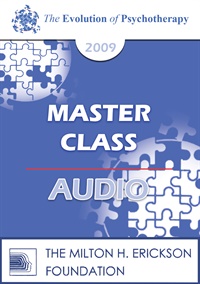
- Average Rating:
- Not yet rated
- Topic Areas:
- Brief Therapy | Experiential Therapy | Gestalt | Hypnosis | Psychotherapy | Ericksonian Hypnosis and Therapy Techniques | Hypnotherapy | Master Classes
- Categories:
- Evolution of Psychotherapy | Evolution of Psychotherapy 2009
- Faculty:
- Jeffrey Zeig, PhD | Erving Polster, PhD
- Duration:
- 2 Hours 49 Minutes
- Format:
- Audio Only
- Original Program Date:
- Dec 14, 2009
- Short Description:
- Gestalt therapy and Ericksonian hypnotherapy are experiential methods of change. In Combination they can be synergistic. Psychotherapy is best when clients have a first hand experience of an alive therapeutic process. Such dynamic empowering experiences pave the way for dynamic understandings. Drs. Polster and Zeig will engage with each other and the participants to examine commonalities and differences in their work.
- Price:
- $15.00 - Base Price
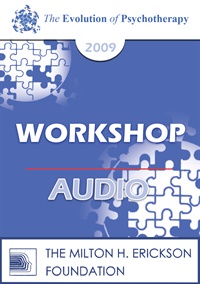
- Average Rating:
- Not yet rated
- Topic Areas:
- Workshops | Psychotherapy
- Categories:
- Evolution of Psychotherapy | Evolution of Psychotherapy 2009
- Faculty:
- Robert Dilts, BA
- Duration:
- 1 Hour 57 Minutes
- Format:
- Audio Only
- Original Program Date:
- Dec 13, 2009
- Short Description:
- Crisis, transition and transformation are three key dynamics we need to address during times of deep upheaval. It is said that things are always changing, but not always progressing. During times of dynamic change, many challenges will present themselves such as meeting the fear of the unknown and unfamiliar, dealing with loss, and a general sense of vulnerability.These can plunge us into unhelpful survival strategies: attack, escape or rigidity (fight, flight, freeze) resulting in regression, inertia and conflict. In order progress though change, it is important to cultivate qualities such as flexibility and stability, balance, connection and the ability to let go.
- Price:
- $15.00 - Base Price
Tags: Psychotherapy
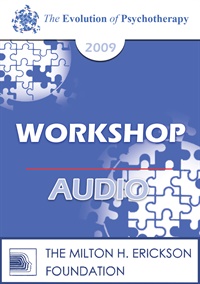
- Average Rating:
- Not yet rated
- Topic Areas:
- Psychotherapy | Workshops | Attunement | Therapeutic Relationship | Therapist Development
- Categories:
- Evolution of Psychotherapy | Evolution of Psychotherapy 2009
- Faculty:
- Jeffrey Zeig, PhD
- Duration:
- 1 Hour 43 Minutes
- Format:
- Audio Only
- Original Program Date:
- Dec 13, 2009
- Short Description:
- Attunement can be considered the deepest level of rapport, a foundation of empathy. We will learn how to attune to affect,behavior, cognition, attitude, perception, and relationship patterns – even how to attune to the preconscious associations that drive behavior. A precursor to every intervention, attunement will be described from the perspective of hypnosis, psychotherapy, and social psychology. Clinical applications will be demonstrated and discussed. Includes small-group practice exercises.
- Price:
- $15.00 - Base Price

- Average Rating:
- Not yet rated
- Topic Areas:
- Workshops | Multicultural | Psychotherapy | Therapist Development
- Categories:
- Evolution of Psychotherapy | Evolution of Psychotherapy 2009
- Faculty:
- Jean Houston, PhD
- Duration:
- 1 Hour 46 Minutes
- Format:
- Audio Only
- Original Program Date:
- Dec 13, 2009
- Short Description:
- Dr Houston will offer a spectrum of ways designed to evoke new capacities in yourself and your clients in at least four areas: sensory and physical, psychological, myths and symbols, as well as spiritual. She will hope to entice you into high sensory development, radical empathy, luminous intelligence, and a polyphrenic nature (enjoying and utilizing the many selves you contain within you). The hope is that the values offered in this workshop will stimulate a passion for the possible,and a capacity to take on the tasks of a world in transition.
- Price:
- $15.00 - Base Price
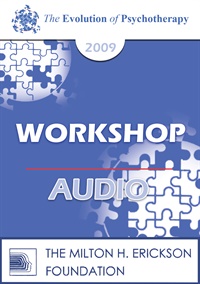
- Average Rating:
- Not yet rated
- Topic Areas:
- Eye Movement Desensitization and Reprocessing (EMDR) | Workshops | Memory | Psychotherapy
- Categories:
- Evolution of Psychotherapy | Evolution of Psychotherapy 2009
- Faculty:
- Francine Shapiro, PhD
- Duration:
- 1 Hour 56 Minutes
- Format:
- Audio Only
- Original Program Date:
- Dec 13, 2009
- Short Description:
- EMDR directly addresses the physiologically stored memory networks that underlie both psychological problems and mental health. This orientation to both case conceptualization and treatment will be explored to address diverse clinical applications, including attachment issues, body image, chronic pain, substance abuse, sexual dysfunction, personality disorders, and other presenting complaints. The Integration of EMDR with family therapy practices will also be discussed.
- Price:
- $15.00 - Base Price
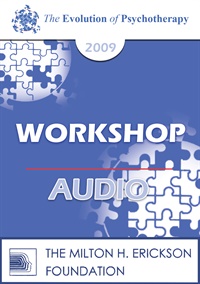
- Average Rating:
- Not yet rated
- Topic Areas:
- Workshops | Psychotherapy | Relationships | Religion | Life Focus Community
- Categories:
- Evolution of Psychotherapy | Evolution of Psychotherapy 2009
- Faculty:
- Erving Polster, PhD
- Duration:
- 1 Hour 39 Minutes
- Format:
- Audio Only
- Original Program Date:
- Dec 13, 2009
- Short Description:
- Extrapolating psychotherapy leadership private sessions into Life Focus Communities would expand therapy’s inter-relational purpose, combining the treasures of belonging with the inspirational powers of people joining together in a continuing examination of the lived life. Dr. Polster will offer some novel comparisons with religion and demonstrate through experiential exercises how such groups may be conducted.
- Price:
- $15.00 - Base Price
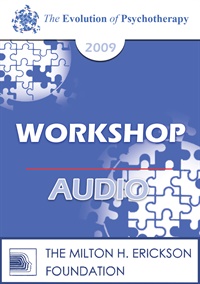
- Average Rating:
- Not yet rated
- Topic Areas:
- Workshops | Children and Adolescent Therapy | Gestalt | Psychotherapy
- Categories:
- Evolution of Psychotherapy | Evolution of Psychotherapy 2009
- Faculty:
- Violet Oaklander, PhD
- Duration:
- 1 Hour 58 Minutes
- Format:
- Audio Only
- Original Program Date:
- Dec 13, 2009
- Short Description:
- Dr. Oaklander will present an approach to working with children and adolescents that involves a variety of projective, creative and expressive techniques with Gestalt Therapy theory, philosophy, and practice as the underlying framework. Included will be an overview of the Oaklander model of the therapeutic process, case material, a direct experience, and discussion.
- Price:
- $15.00 - Base Price
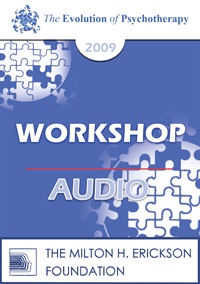
- Average Rating:
- Not yet rated
- Topic Areas:
- Workshops | Neurobiology | Psychotherapy | Relationships
- Categories:
- Evolution of Psychotherapy | Evolution of Psychotherapy 2009
- Faculty:
- Daniel Siegel, MD
- Duration:
- 2 Hours
- Format:
- Audio Only
- Original Program Date:
- Dec 13, 2009
- Short Description:
- This workshop will immerse us in an exploration of how the human brain, mind, and relationships form an interconnected“triangle of well-being” involving the flow of energy and information. The mind regulates this flow; our relationships share this flow; and the brain serves as a mechanism mediating this flow. Knowing how to work with empathic relationships, a coherent mind, and an integrated brain builds a perspective on how to approach psychotherapy from an “interpersonal neurobiology” perspective. Nine domains of integration will be highlighted for application in psychotherapy.
- Price:
- $15.00 - Base Price
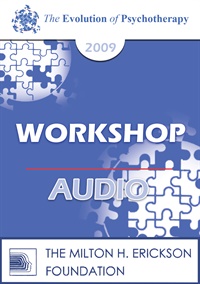
- Average Rating:
- Not yet rated
- Topic Areas:
- Workshops | Mindfulness | Acceptance and Commitment Therapy (ACT) | Psychotherapy
- Categories:
- Evolution of Psychotherapy | Evolution of Psychotherapy 2009
- Faculty:
- Steven Hayes, PhD
- Duration:
- 58 Minutes
- Format:
- Audio Only
- Original Program Date:
- Dec 13, 2009
- Short Description:
- This workshop will show how to detect and modify acceptance, mindfulness and values processes moment to moment in therapy sessions, based primarily on methods drawn from Acceptance and Commitment Therapy (ACT). The primary method used will be tape of real clinical sessions, with start and stop discussions.
- Price:
- $15.00 - Base Price
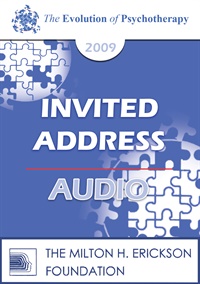
- Average Rating:
- Not yet rated
- Topic Areas:
- Invited Addresses | Psychology | Psychotherapy
- Categories:
- Evolution of Psychotherapy | Evolution of Psychotherapy 2009
- Faculty:
- Jean Houston, PhD
- Duration:
- 58 Minutes
- Format:
- Audio Only
- Original Program Date:
- Dec 13, 2009
- Short Description:
- Dr. Houston will offer ways and means to profoundly make a difference for the betterment of people, communities, organizations and cultures worldwide. Drawing on her work in over 100 countries in training leaders in human development in the light of social change, she will offer liberating thought ways, as well as techniques of activating human and social potentials in sensory, psychological, mythic and symbolic, as well as, spiritual and integral levels of the human capacity. Together, these lead to enhanced abilities to creatively and effectively deal with present challenges. Dr. Houston will address the unique place that present movements in psychology have to offer in a world of radical shifts.
- Price:
- $15.00 - Base Price
Tags: Psychology Psychotherapy
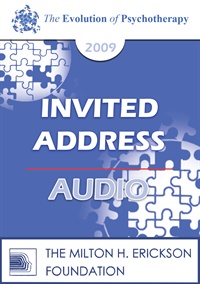
- Average Rating:
- Not yet rated
- Topic Areas:
- Invited Addresses | Attachment | Trauma | Psychotherapy
- Categories:
- Evolution of Psychotherapy | Evolution of Psychotherapy 2009
- Faculty:
- Bessel van der Kolk, MD
- Duration:
- 46 Minutes
- Format:
- Audio Only
- Original Program Date:
- Dec 13, 2009
- Short Description:
- The study of psychological trauma has been accompanied by an explosion of knowledge about how experience shapes the central nervous system and the formation of the self. The study of trauma has probably been the single most fertile area in developing a deeper understanding of the relationship among the emotional, cognitive, social, and biological forces that shape human development.
- Price:
- $15.00 - Base Price
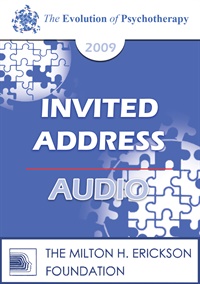
- Average Rating:
- Not yet rated
- Topic Areas:
- Invited Addresses | Psychotherapy | Abuse | Children and Adolescent Therapy
- Categories:
- Evolution of Psychotherapy | Evolution of Psychotherapy 2009 | Pioneers in Couples and Family Therapy
- Faculty:
- Cloe Madanes, HDL, LIC
- Duration:
- 52 Minutes
- Format:
- Audio Only
- Original Program Date:
- Dec 13, 2009
- Short Description:
- Cloe Madanes shares case-based strategies for treating children and adolescents. Stories include resolving tantrums through imaginative play, improving family communication amid financial stress, and supporting anorexia recovery through parental honesty and compassion.
- Price:
- $15.00 - Base Price
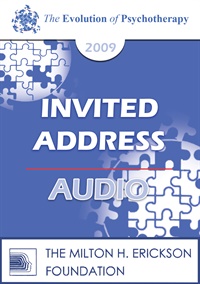
- Average Rating:
- Not yet rated
- Topic Areas:
- Invited Addresses | Marriage | Couples Therapy | Family Therapy | Psychotherapy
- Categories:
- Evolution of Psychotherapy | Evolution of Psychotherapy 2009
- Faculty:
- John Gottman, PhD | Julie Gottman, PhD
- Duration:
- 43 Minutes
- Format:
- Audio Only
- Original Program Date:
- Dec 13, 2009
- Short Description:
- Longitudinal research with newlyweds shows that 67% have a drop in marital satisfaction in the first three years of their baby’s life. Hostility between the partners increases, and the baby’s emotional, cognitive, and neurological development are all adversely affected. The Bringing Baby Home program, which will be described, is effective in preventing both these negative changes and post-partum depression.
- Price:
- $15.00 - Base Price
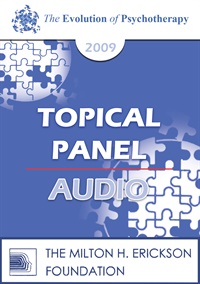
- Average Rating:
- Not yet rated
- Topic Areas:
- Psychotherapy | Topical Panels | Art and Creativity
- Categories:
- Evolution of Psychotherapy | Evolution of Psychotherapy 2009
- Faculty:
- Steven Hayes, PhD | James Hillman, PhD | Erving Polster, PhD
- Duration:
- 56 Minutes
- Format:
- Audio Only
- Original Program Date:
- Dec 12, 2009
- Short Description:
- EP09 Topical Panel 17 – Psychotherapy: Art or Science? – Steven Hayes, James Hillman, and Erving Polster Educational Objective: To compare and contrast clinical and philosophical perspectives of experts.
- Price:
- $15.00 - Base Price
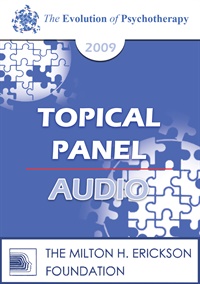
- Average Rating:
- Not yet rated
- Topic Areas:
- Topical Panels | Self-Relations | Solution Oriented Approach | Neuro-Linguistic Programming (NLP) | Psychotherapy | Ericksonian Hypnosis and Therapy Techniques | Milton Erickson
- Categories:
- Evolution of Psychotherapy | Evolution of Psychotherapy 2009 | Pioneers in Couples and Family Therapy
- Faculty:
- Robert Dilts, BA | Stephen Gilligan, PhD | Michele Weiner-Davis, LCSW
- Duration:
- 1 hour
- Format:
- Audio Only
- Original Program Date:
- Dec 12, 2009
- Short Description:
- This panel explores the legacy of Milton Erickson through the lenses of NLP, solution-focused therapy, and self-relations. Robert Dilts highlights Erickson’s process-based approach. Stephen Gilligan focuses on utilization and unconscious dynamics. Michele Weiner-Davis reflects on her shift toward resilience and directive strategies. The conversation also addresses agency challenges and the clinical role of self-disclosure.
- Price:
- $15.00 - Base Price

- Average Rating:
- Not yet rated
- Topic Areas:
- Meditation, Spirituality and Yoga | Workshops | Dreamwork | Genomics | Neuroscience | Psychotherapy
- Categories:
- Evolution of Psychotherapy | Evolution of Psychotherapy 2009
- Faculty:
- Ernest Rossi, PhD
- Duration:
- 2 Hours 44 Minutes
- Format:
- Audio Only
- Original Program Date:
- Dec 12, 2009
- Short Description:
- Revolutionary research in neuroscience and functional genomics documents show how experiences of novelty, environmental enrichment, and exercise (both mental and physical) can optimize gene expression, brain plasticity, healing and life extension in dreams, meditation and spiritual rituals. In this workshop, we will experience the four-stage creative cycle in ourselves and in others.
- Price:
- $15.00 - Base Price
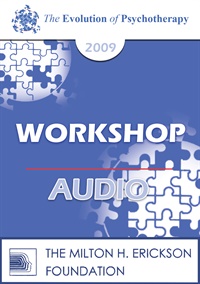
- Average Rating:
- Not yet rated
- Topic Areas:
- Trauma | Workshops | Psychotherapy
- Categories:
- Evolution of Psychotherapy | Evolution of Psychotherapy 2009
- Faculty:
- Bessel van der Kolk, MD
- Duration:
- 2 Hours 18 Minutes
- Format:
- Audio Only
- Original Program Date:
- Dec 12, 2009
- Short Description:
- The study of psychological trauma has been accompanied by an explosion of knowledge about how experience shapes the central nervous system and the formation of the self. We have learned that most experience is automatically processed on a subcortical level, i.e. by “unconscious” interpretations that take place outside of awareness. Insight and understanding have only a limited influence on the operation of theses subcortical processes. When addressing the problems of traumatized people who, in a myriad of ways, continue to react to current experience as a replay of the past, there is a need for therapeutic methods that do not depend exclusively on understanding and cognition. This workshop surveys current research on how people’s brains, minds and bodies respond to traumatic experiences, and will specifically address the use of affect modulation techniques, EMDR, yoga, theater, and neuro feedback in overcoming various aspects of the destabilization and disintegration caused by trauma.
- Price:
- $15.00 - Base Price
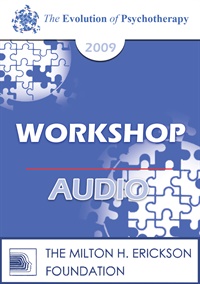
- Average Rating:
- Not yet rated
- Topic Areas:
- Consciousness | Psychotherapy | Workshops | Generative Psychotherapy
- Categories:
- Evolution of Psychotherapy | Evolution of Psychotherapy 2009
- Faculty:
- Stephen Gilligan, PhD
- Duration:
- 2 Hours 47 Minutes
- Format:
- Audio Only
- Original Program Date:
- Dec 12, 2009
- Short Description:
- The Generational Self approach emphasizes how the state of consciousness in which an experiential challenge is held determines whether a problem or solution develops. The model identifies three types of mind – Somatic, Cognitive, and Field,and how each mind can be operating at a Primitive, Ego, or Generative level. We will see how a problem degrades a person’s consciousness level so that change is impossible, and how that low-level state can be improved to a Generative level, so that the problematic experience either spontaneously changes, or is more easily engaged. Numerous practical techniques and clinical examples will be offered.
- Price:
- $15.00 - Base Price
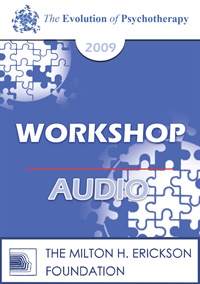
- Average Rating:
- Not yet rated
- Topic Areas:
- Workshops | Love | Emotionally Focused Therapy (EFT) | Psychotherapy
- Categories:
- Evolution of Psychotherapy | Evolution of Psychotherapy 2009
- Faculty:
- Sue Johnson, EdD
- Duration:
- 2 Hours 12 Minutes
- Format:
- Audio Only
- Original Program Date:
- Dec 12, 2009
- Short Description:
- This workshop offers participants the wisdom gained from our new scientific understanding of love, and from 25 years of research and clinical practice in Emotionally Focused Couple Therapy (EFT). The first part of the workshop will present a clear picture of romantic love as the natural arena for personal health, resilience and growth. The second part of the workshop outlines and guides participants into four conversations to enhance your relationship: Recognizing Demon Dialogues, Finding Raw Spots, the pivotal Hold Me Tight conversation, and Forgiving Injuries. Better communication, more effective problem solving, more empathetic caring and improved sexual relationships are just some of the improvements associated with a more secure bond.
- Price:
- $15.00 - Base Price
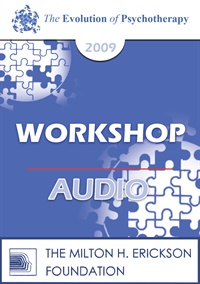
- Average Rating:
- Not yet rated
- Topic Areas:
- Workshops | Improvisation | Gestalt | Relationships | Storytelling | Psychotherapy
- Categories:
- Evolution of Psychotherapy | Evolution of Psychotherapy 2009
- Faculty:
- Erving Polster, PhD
- Duration:
- 2 Hours 48 Minutes
- Format:
- Audio Only
- Original Program Date:
- Dec 12, 2009
- Short Description:
- Dr. Polster will show how a deep relational duet can be created and, joined with therapeutic experiments and awareness expansion, provide a landscape of high focus, surprise, directionalism and radiance in the search for a sense of personal wholeness.Creation of fluidity, dependable identity, microcosmic lessons, and fresh storytelling will serve as major vehicles.
- Price:
- $15.00 - Base Price
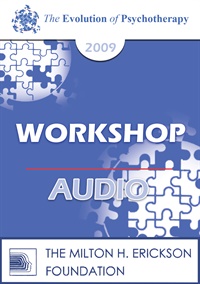
- Average Rating:
- Not yet rated
- Topic Areas:
- Psychology | Workshops | Positive Psychology | Depression | Happiness | Psychotherapy
- Categories:
- Evolution of Psychotherapy | Evolution of Psychotherapy 2009
- Faculty:
- Martin Seligman, PhD
- Duration:
- 2 Hours 6 Minutes
- Format:
- Audio Only
- Original Program Date:
- Dec 12, 2009
- Short Description:
- Happiness can be usefully dissolved into the Pleasant Life (Positive Emotions), the Engaged Life, and the Meaningful Life.The mission of Positive Psychology is to understand and build these three lives. Dr. Seligman will describe interventions that raise happiness, so defined, and will detail their effects on depression.
- Price:
- $15.00 - Base Price
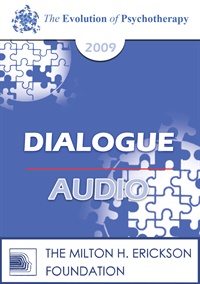
- Average Rating:
- Not yet rated
- Topic Areas:
- Dialogues | Humor | Psychotherapy | Therapist Development | Ericksonian Hypnosis and Therapy Techniques
- Categories:
- Evolution of Psychotherapy | Evolution of Psychotherapy 2009 | Pioneers in Couples and Family Therapy
- Faculty:
- Cloe Madanes, HDL, LIC | Jeffrey Zeig, PhD
- Duration:
- 55 Minutes
- Format:
- Audio Only
- Original Program Date:
- Dec 12, 2009
- Short Description:
- This dialogue highlights the role of humor in therapy as a tool for connection and transformation. Through case examples and personal stories, the speakers demonstrate how laughter, creativity, and well-timed humor can shift perspective and make therapeutic interventions more effective.
- Price:
- $15.00 - Base Price
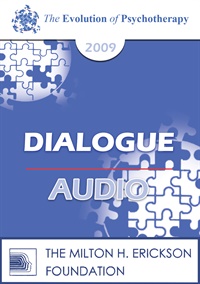
- Average Rating:
- Not yet rated
- Topic Areas:
- Couples Therapy | Dialogues | Relationships | Therapist Development
- Categories:
- Evolution of Psychotherapy | Evolution of Psychotherapy 2009 | Pioneers in Couples and Family Therapy
- Faculty:
- John Gottman, PhD | Julie Gottman, PhD | Salvador Minuchin, MD
- Duration:
- 1 Hour
- Format:
- Audio Only
- Original Program Date:
- Dec 12, 2009
- Short Description:
- This discussion explores trust, repair, and relational resilience. The Gottmans share research on what sustains long-term bonds, including humor, gentleness, and shared meaning. Minuchin reflects on the architecture of secure relationships, addressing conflict, intimacy, and post-infidelity repair through a systemic lens.
- Price:
- $15.00 - Base Price
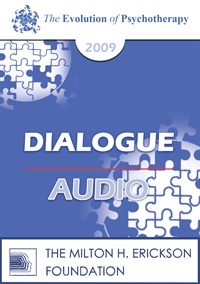
- Average Rating:
- Not yet rated
- Topic Areas:
- Psychotherapy | Dialogues
- Categories:
- Evolution of Psychotherapy | Evolution of Psychotherapy 2009
- Faculty:
- Albert Bandura | Nicholas Cummings, PhD
- Duration:
- 1 Hour
- Format:
- Audio Only
- Original Program Date:
- Dec 12, 2009
- Short Description:
- EP09 Dialogue 14 – Evolution and De-Evolution of Psychotherapy – Albert Bandura, PhD and Nicholas Cummings, PhD, ScD Educational Objective: Given a topic, to describe the differing approaches to psychotherapy, and to identify the strengths and weaknesses of each approach.
- Price:
- $15.00 - Base Price
Tags: Psychotherapy

